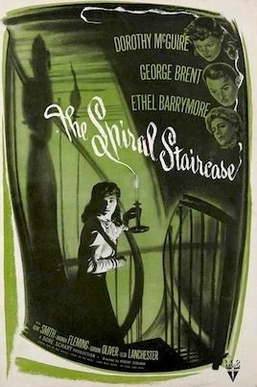
My grandfather used to take me to this old revival theater up in Keene New Hampshire when I was young, some of my earliest memories of the movies were at that theater, seeing all the lavishly made films that were so grandus in story and stars, I miss those days, and though many of those movies are forever burned in my mind, and I shall write on them later, I felt this should be the first, after all, this was the first movie my grandfather took me to there, so it only seems fitting right? I'm just lucky that my first there was such a great movie, 1945's "The Spiral Staircase" one of the first non-german named movies of director Robert Siodmak, and is said to have been a favorite of a tubby little man some of you might have heard of by the name of Alfred Hitchcock, I heard he made those moving pictures or something, but I can't find any list of his work, so he must not be that great.....
.... yes I'm joking...
Anyway.. the plot of The Spiral Staircase is pretty great, its based on a book and a radio play that starred the amazing Helen Hayes, both called "Some Must Watch", its name was changed to reflect a key scene when it made it to the movie screen. There were some changes made, mostly minor except the lead character is mute in the movie, not crippled as in the book and radio play.
The Plot is basically this, its 1915 in a small unnamed town in New England (its implied that its in New Hampshire given the exterior locations) there is a serial killer going around killing disabled young girls, a path that leads directly to Helen Capel, a mute girl who is in the employ of rich but unable to get out of bed Mrs. Warren, who along with the house staff's doctor and many others who work for the Warren family beg Helen to go into hiding until this is all over, but she refuses to do so, even after a murder happens with in the Warren House itself. The movie is set in the backdrop of this really large gothic looking mansion in a thunderstorm as Helen attempts to survive not only the killer who she believes to be inside the home itself, but her own paranoia and that of those around her as well and last the night.
It might sound contrived and played out like an atari 2600 by today's standards, but you have to remember, in 1945, this was the hight of psychological thrillers, and still to this day, newer viewers feel chills that go down their spine at the very watching, it plays with your perceptions and senses, it makes you think you see things in dark corners and flashes of thunder that aren't really there, you feel almost transported into the world. There is alot of visual symbols too, the silent movie "The Sands of Dee" by director D.W. Griffith (the director who made the insanely offensive silent film "The Birth Of A Nation" in 1915, about how the Klu Klux Klan "saved" america from a black over run south.. yeah I was offended writing that too) is used to kind of bring you into the world of a mute, and help you understand what life is kind of like for some one like that, a pretty good choice of reference, even if i don't exactly agree with the director who was picked, but I guess Chaplin was under contract somewhere else at the time or something.
The movie stands still as one of the best examples of a thriller and is studied by film students even today, its been remade twice to my knowledge, in 1975 as a theatrical starring Jacqueline Bisset and in 2000 as a tv movie starring Nicolette Sheridan. And was seen as a vehicle for Dorothy McGuire and showcased the brilliant Ethel Barrymore, one of the early actors in the very famous Barrymore acting family.
I know my discription is very vague and not really helpful for some, but well, I don't wanna give it all away, there is alot to see in this film and I'd really hate to spoil it for anyone thats not seen it yet. So if you're up for an awesome older movie thats just so beautifully crafted it'll make you mad at today's attempts at film making, give this one a shot. Hitchcock did and look where he ended up.
--
BC
No comments:
Post a Comment